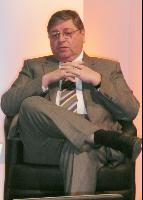ITB Hospitality Day: Discussion round on "Reactions to the Recession"
Berlin (April 10, 2009). With which tidings of economic doom should one start? With the news that Ryanair recently considered implementing a WC charge on board its flights? Or with the announcement from the Association of German Travel Managment this week, that rapid recovery from the crisis isn't to be expected? At present, almost everyone is chipping in with his own grim news. All the more refreshing then, that the discussion "Reactions to the Recession" which took place at the ITB hotel conference, the "ITB Hospitality Day", didn't also fan the panic. Top managers from Accor, Falkensteiner, Choice and Treugast discussed the current situation and made pragmatic suggestions for listeners.
 |
Marc Hildebrand,
Accor.
|
What exactly are we complaining about? Host Prof Christian Buer from the University of Applied Sciences in Heilbronn asked as he opened the discussion. He questioned the indicators of the crisis and concluded: "Recession is upon us, but this time the crisis is different. This time, it's global, and banks are refusing to lend in order to kick start the economy." He asked those participating in the discussion where the profits from recent years were and whether rates are the only means of steering development.
Marc Hildebrand, CEO of Accor Hotellerie Germany, responded, analysing the consequences: For every euro lost, a whole six months are needed to make this back. "We prefer to lose three to five percent occupancy than to reduce the price!" said Hildebrand, head of Germany's biggest hotel chain. In January and February, Accor even managed to implement rate increases across almost all of its brands.
Hans-Dieter Schiller, Vice President European Operations of the franchise company Choice Hotels, represented the private hotel industry looking to join a strong brand. He too pleaded for hotels to hold their nerve in respect of rates, though referred to the "pain threshold" of private hotels, for which small price reductions would certainly bring an advantage against the chain hotel around the corner.
 |
Hans-Dieter Schiller,
Choice.
|
Stephan Gerhard from Treugast Solutions Group - Consultant, Hotel Operator and Investor - feared that in the end even the chains would capitulate on price and that this would result in the same tragedy in rates as was seen after 2001. "I fear that that will be the case."
Resorts can easily add value
Erich Falkensteiner, Managing Partner of the Falkensteiner Michaeler Tourism Group in Austria, moved the focus from ailing city hotels to the resorts. "For the resorts, it's a matter of life and death that they create added value," he stated, looking back on his own experience: Five years ago, Falkensteiner gave each guest a pair of skis on arrival - that brought 11,000 additional guests within the space of only a few weeks. However, the hotel boss admitted that it was more difficult to create added value in city hotels.
Stephan Gerhard added that most hotels/hotel groups had already reduced costs as far as possible after 2001. Reducing rates even further would mean reducing quality - "and falling flat after the crisis!" Controlling costs whilst at the same time increasing quality (which in itself produces costs) is "not feasible," he asserted. The line is thus a fine one.
 |
Stephan Gerhard,
Treugast.
|
What other models are available for cost reduction, Prof Buer asked and meant, more concretely, personnel costs as a hotel's main cost block. Marc Hildebrand explained four new models applied by Accor: Reduction of weekly working time with a 10% drop in pay, additional unpaid holiday, extended parental leave and offer of sabbatical with job guarantee on return (see link). Even if only 20% of the 9,000 staff in Germany would take advantage of these measures, the chain hopes to make significant savings through 2009.
Private hoteliers will have to use their profits
Hans-Dieter Schiller commented that such models are hardly applicable within the smaller teams employed in the private hotel industry. Choice thus attempts as best it can to draw as much benefit as possible from what it knows best: distribution and marketing. The budget this year was even increased in Germany. In the USA, it remained steady, though at least wasn't reduced. A current survey over 2,000 hotels showed the questions and problems facing the industry. From conversations with franchise partners, Schiller knows that many will today be able to build using the profits accrued over previous years and will get through the crisis this way.
 |
Erich Falkensteiner,
Falkensteiner
Michaeler
Tourism Group.
all photos: map |
Accor too is now beginning to dig into the fat accumulated over previous years in order to continue to invest. The chain plans 100 to 150 news hotels in the next five years. "Investment is the best we can do in the crisis," he told colleagues. This year too, as in previous years, Accor will channel 50 to 60 million into the renovation of existing hotels.
The host's question as to the possibility of state subsidies - the 8 billion Euro state economic recovery package is also open to the hotel industry - brought the discussion back to the subject of VAT. At 19%, Germany is at a clear disadvantage relative to other European countries. All participants were clear in their opinion on this matter. Money saved from any reduction in value added tax would be well applied under Accor CEO Marc Hildebrand. He would pass on one third of the reduction to guests, would invest a further third and the remaining third he's use to increase wages and salaries. Even after the crisis, after all, the hotel industry will need all its strength to hold both quality and rates. / map
Continuative Links:
To print this article you have to be registered and logged in for newsletter, visitor or subscription.










